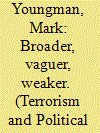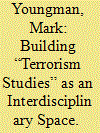| Srl | Item |
| 1 |
ID:
166667


|
|
|
|
|
| Summary/Abstract |
In October 2007, veteran Chechen field commander Dokka Umarov proclaimed the formation of the Caucasus Emirate (IK), formalising the victory of the North Caucasus insurgency’s Islamist wing over its nationalist-separatists. During Umarov’s time as leader, the North Caucasus experienced sustained violence and the IK claimed responsibility for multiple terrorist attacks in and beyond the region. However, despite the importance of ideology in understanding insurgent behaviour, the IK’s ideology and Umarov’s role in shaping it remain understudied. Using Social Movement Theory’s concept of framing to analyse Umarov’s communiqués throughout his lengthy tenure (June 2006–September 2013), this article identifies three distinct phases in Umarov’s ideological positioning of the insurgency: nationalist-jihadist (June 2006–October 2007); Khattabist (October 2007–late 2010); and partially hybridised (late 2010–September 2013). The article contributes to debates over typologies of jihadist actors by highlighting the difficulties in applying them to the North Caucasus and provides a clearer understanding of the IK’s ideological transformation and the limits to its engagement with external actors. The article also illustrates that weakness was a key factor in explaining that transformation and identifies several avenues for research that could further enhance our understanding of the IK’s ideology and the role it plays.
|
|
|
|
|
|
|
|
|
|
|
|
|
|
|
|
| 2 |
ID:
175713


|
|
|
|
|
| Summary/Abstract |
Over the years, there have been many debates regarding the state of research into terrorism and whether “terrorism studies” constitutes an academic discipline in its own right. Such reflections, coupled with the natural evolution of what is still a relatively new area of research, have arguably led to significant improvements in quality and rigour. At the same time, the status of terrorism studies itself remains somewhat ambiguous: it is both discussed as a distinct field and simultaneously evades criticism by pointing to the difficulties of defining its boundaries. There are undoubtedly a number of advantages to forming a separate discipline, which would go some way to helping the field address some of the recurring problems that terrorism research faces. However, this article ultimately argues that scholars are better served by deliberately moving in the other direction and developing the field as a space for interdisciplinary engagement.
|
|
|
|
|
|
|
|
|
|
|
|
|
|
|
|